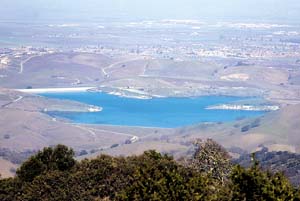During a recent inspection of a pipe that sends water from San
Luis Reservoir to San Benito and Santa Clara counties, customers
received water from the basin where invasive zebra mussels were
found, the county’s water district reported today.
During a recent inspection of a pipe that sends water from San Luis Reservoir to San Benito and Santa Clara counties, customers received water from the basin where invasive zebra mussels were found, the county’s water district reported today.
Water does not typically flow out of San Justo Reservoir, San Benito County Water District Manager Lance Johnson said today.
For four weeks, water was delivered from the reservoir via reverse flow because of the pipe inspection, Johnson said.
What concerns local agriculture officials is the potential for the zebra mussels to clog irrigation lines, disrupting delivery of high-quality water to the county’s farmers.
“As far as the crops, I don’t think it’s a concern,” San Benito County Agricultural Commissioner Paul Matulich said, “Just choking off the lines (is the concern).”
The water district does not know who exactly received water while the San Felipe Conduit was closed in November and December, Johnson said.
“We’re nailing all that down right now,” he said, adding, “Demands were extremely low during that period.”
State officials confirmed Tuesday the presence of zebra mussels in San Justo Reservoir – the first time the invasive species had been found in California. A U.S. Bureau of Reclamation official said the mussels found in the reservoir appear to be 1 to 3 years old.
Dr. Daniel P. Molloy, director of Cambridge Field Research Laboratory at the New York State Museum, who has researched the zebra mussel for nearly two decades, said the mollusk travels downstream and is a prolific breeder.
Molloy said the mussels’ larvae could have spread out of the reservoir and into irrigation lines. Zebra mussels could then disrupt distribution of water.
“You don’t want them to get established there because even if you kill them, when they get older, the shells alone could be a problem,” Molloy said of irrigation lines.
Johnson said federal, state and local government agencies were meeting via teleconference today to discuss the zebra mussel problem.
Also check out:










